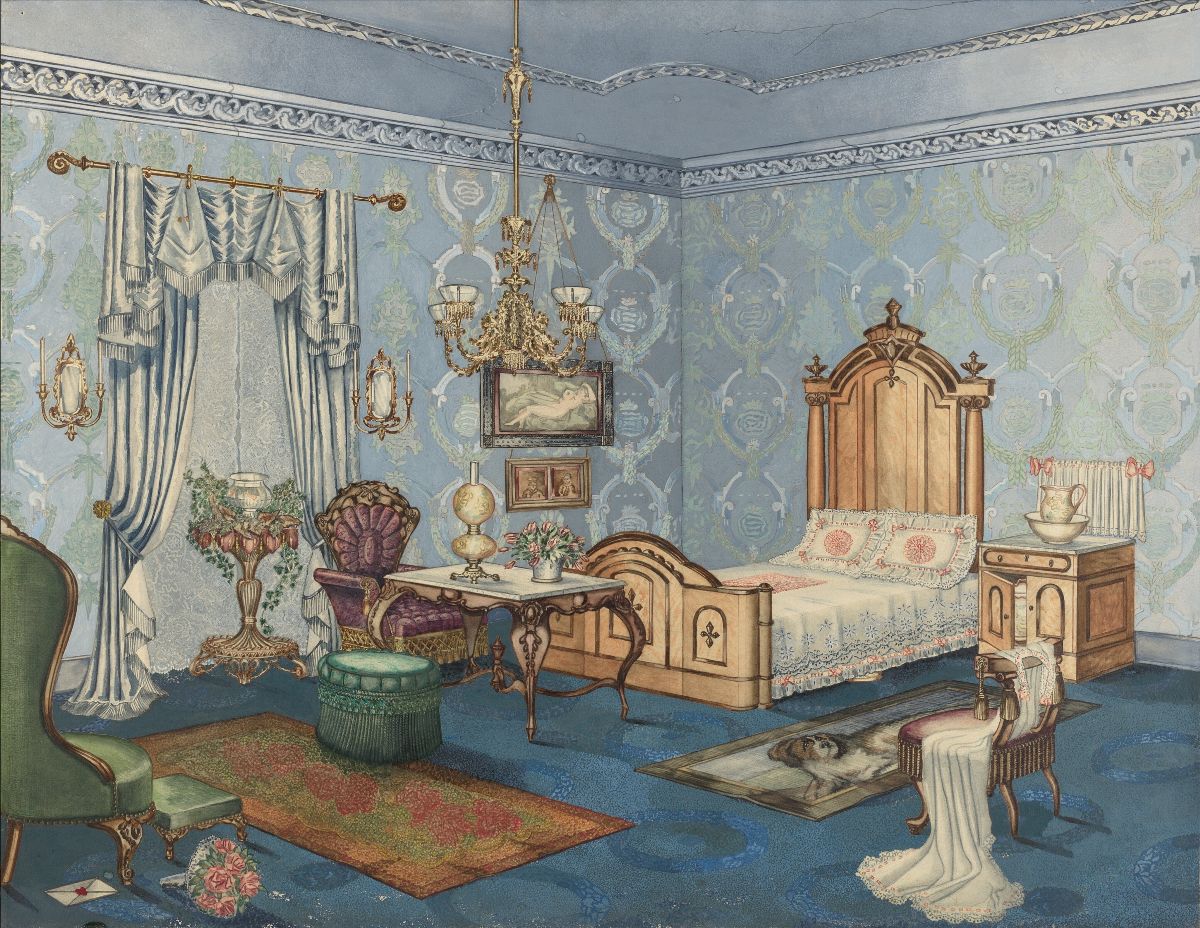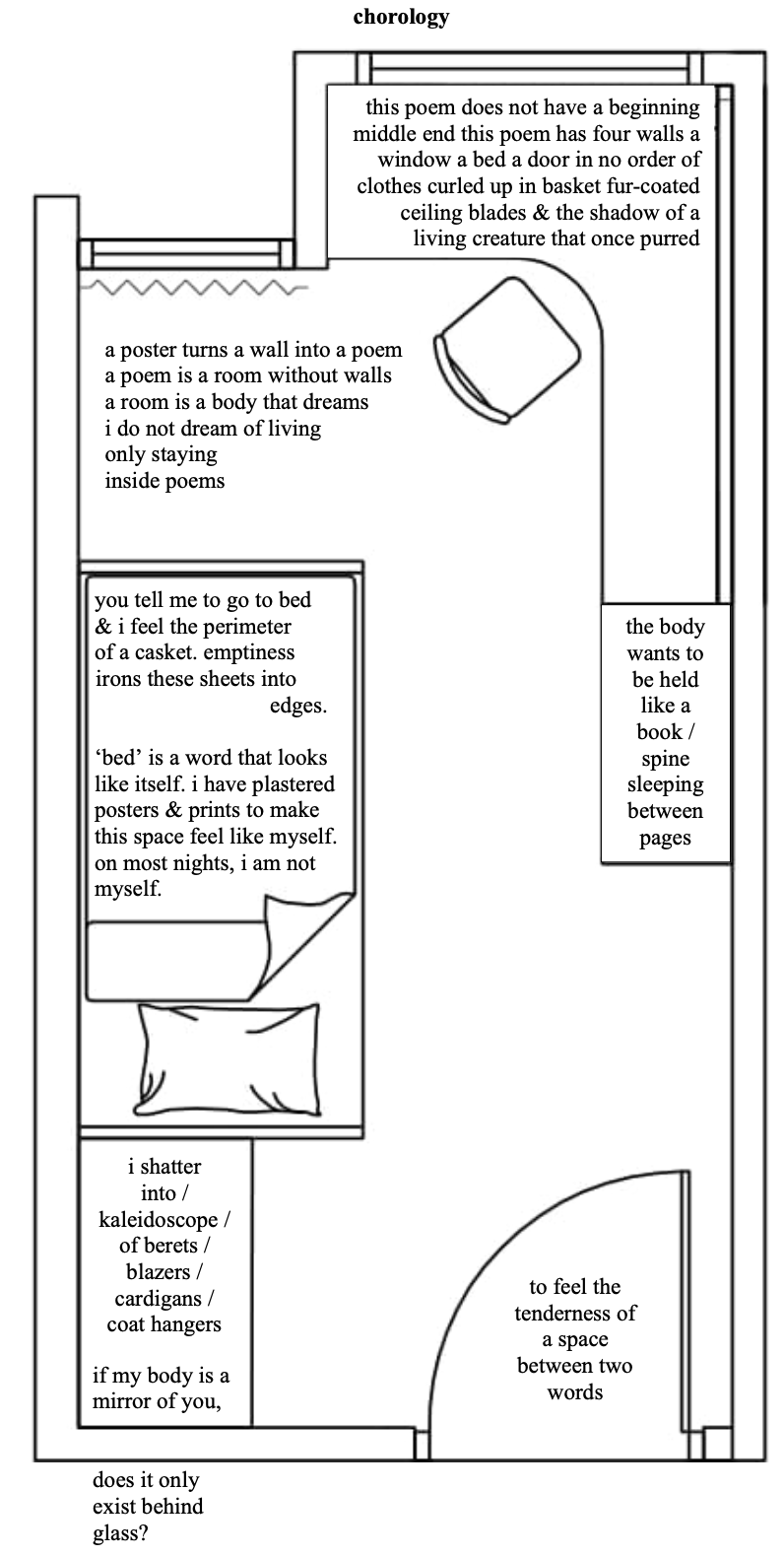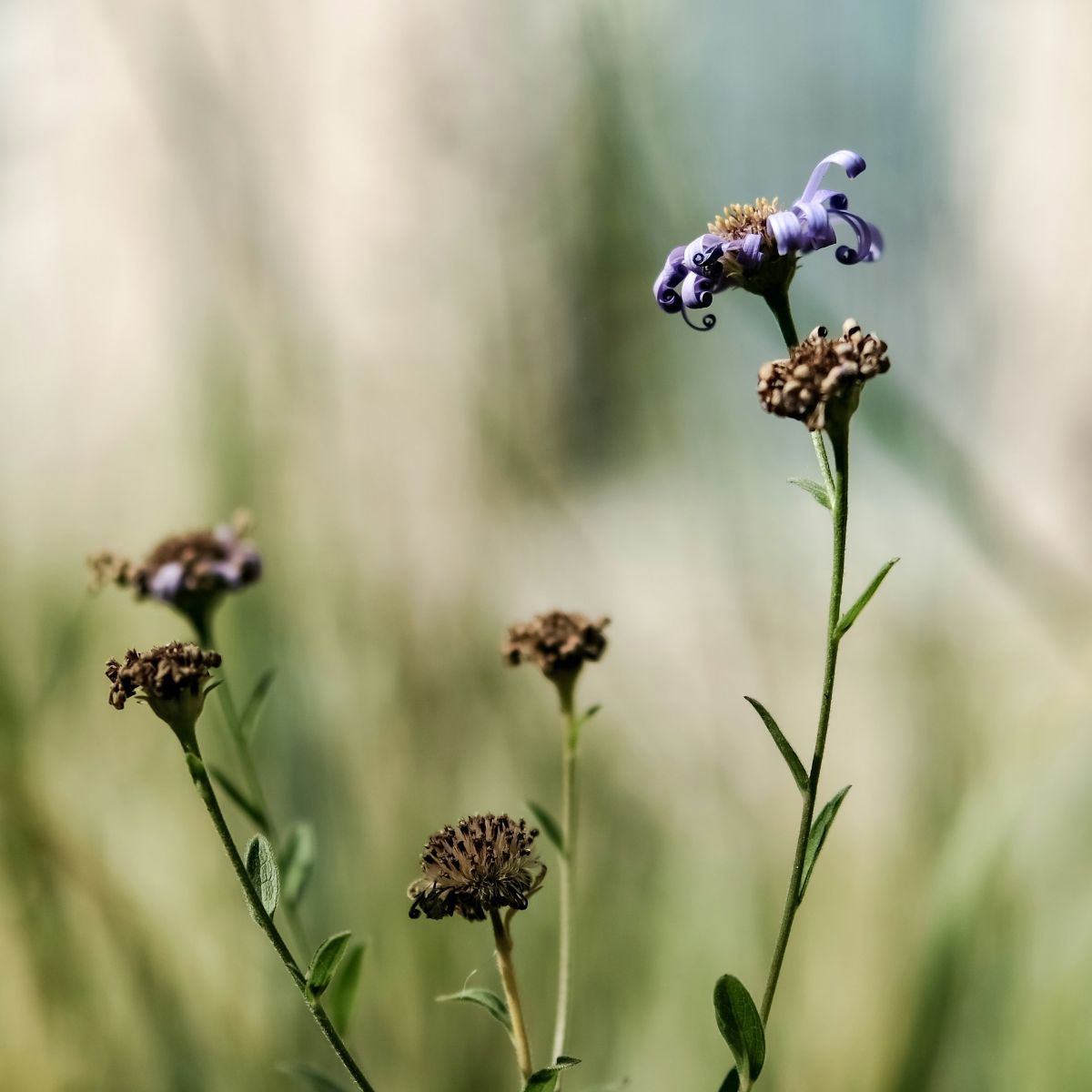
Bedroom, 1882, c. 1941 • Perkins Harnly • Courtesy National Gallery of Art, Washington
This month we offer spine sleeping between pages, rest.
Next month we
DREAM
Submission guidelines can be found here.

Winter A. Chen is a transgender Chinese poet, performer, and artist from Singapore. She holds a MA in Poetic Practice from Royal Holloway, University of London. She loves learning K-Pop choreography and playing an unhealthy amount of League of Legends.

August Pause
I am listening to NPR on the car radio. I have to stop and pull over.
Ingrid Betancourt, once a candidate for president of Colombia but kidnapped by the Revolutionary Armed Forces of Colombia (FARC), held captive for six years in the jungle, and miraculously rescued, is being asked about her plans.
“When you cross the valley of tears, and you arrive to the oasis, the reward of God is rest. So that’s what I want for me now.”
I hear the instruction in her testimony and I have to pause.
I don’t rest. I have a large garden and a garden design business. Everyone wants a hydrangea. The hydrangeas always need pruning.
One spring I went to Long’s Lumber and bought a small table and four benches to place under the linden tree. Sara, my partner, approved. She said the benches were just the right height for the table. She thinks I work too hard. She could imagine lunch at the table.
The next day I went back and bought two rocking chairs for the patio.
The cedar furniture looked solid. When I applied two coats of Olympic transparent stain, the chairs came alive and glowed, inviting me to sit. Over the weekend I chatted with my neighbor. She was in her backyard spray-painting her outdoor furniture a brilliant blue. We both resolved that in the coming summer we would rest.
I didn’t. She didn’t. I use the table to lay out my tools. This makes them easy to find. The rocker offers a perfect place to drape a sweatshirt once the spring morning chill has abated. Nancy, my neighbor, sets pots to plant on her blue chairs.
Pride, rage, envy, greed, lust – all these afflict the gardener who gloats at acquiring the latest cultivar of an exotic rose while envying her neighbor’s still rarer acquisition and cursing the supplier that failed to alert. But sloth in the garden? Not a chance.
In March and April I get the gardens ready for the season. I rake, cut back dead stems, edge beds, mulch. In May I dig up and transplant, divide and move. In June I shop and purchase and plant. In July I weed. In September I do late season transplants and make lists of the work to be done next year. In October and November I make the gardens ready for winter. In winter, I study and plan and write and give talks – about the garden.
I don’t rest.
In August, however, there comes a pause, one I do not ask for or make happen. The garden goes suddenly, eerily still. I hear no birds and the tall grasses stop moving. I am seized by terror, and I must put down my tools. Am I marking an anniversary?
“We were outside one August day when I noticed you could not get up the steps to the back porch,” my mother told me years later. A frantic trip to the hospital revealed that I’d contracted tuberculosis from the “girl” my father insisted my mother hire to help her with housework and childcare.
“Take her home,” the doctor told my mother. “There is nothing we can do. She’ll be dead by morning.” I was eighteen months old.
The moment passes, but it gives me pause. Does my body remember what my consciousness cannot? That life hangs by such a slender thread? That at any moment we might slip into the abyss? That I nearly died but didn’t?
My doctor reminds me that I need to slow down.
“You’re 85, your back is shot, and you need a knee replacement. Are you trying to kill yourself?”
I think I fear that rest is death.
I ask my therapist, “What are the tasks of the third stage of life?”
“Reminiscing, sorting stuff, taking care of the money, and resting,” she answers.
Resting as a necessary task of living?
In Blue Arabesque Patrician Hampl recounts how she once asked a nun who had lived many years cloistered in a monastery cell what she saw as the core of the contemplative life.
“‘Leisure,’ she said, without hesitation, her china blue eyes cheerfully steady on me.”
Leisure as the necessary path to insight?
I could easily work long days in the August garden. Late summer makes it easy to see where another Azalea should be planted and which Hostas need dividing and where there is too much Joe-Pye-weed. But do I need to plant, divide and dig up now when summer is over and fall just around the corner?
I could deadhead the Echinacea but why should I? I love the look of the seed heads tumbling in and among the still-blooming flowers. The goldfinches love the seed heads too. They land on them, pecking for food, and bounce around, flinging a bit of their yellow into the purple and white mix.
Let the birds exhaust themselves, I think. My August garden reminds me I have crossed the valley and reached the oasis and now it is time to rest.
Judith Fetterley is a former Distinguished Teaching Professor of American Literature, Women’s Studies, and Writing Studies at the University at Albany/State University of New York. She is the author of The Resisting Reader: A Feminist Approach to American Fiction and of Writing out of Place: Regionalism, Women, and American Literary Culture. Since leaving her academic appointment, she has owned and managed a small garden design business, Perennial Wisdom, and become a Master Gardener for the Albany County Cornell Co-operative Extension. She currently writes a bi-monthly newsletter, “Out in the Garden,” which can be read and subscribed to on her website, www.Perenialwisdom.


This month we offer spine sleeping between pages, rest.
Next month we
DREAM
Submission guidelines can be found here.

Winter A. Chen is a transgender Chinese poet, performer, and artist from Singapore. She holds a MA in Poetic Practice from Royal Holloway, University of London. She loves learning K-Pop choreography and playing an unhealthy amount of League of Legends.

August Pause
I am listening to NPR on the car radio. I have to stop and pull over.
Ingrid Betancourt, once a candidate for president of Colombia but kidnapped by the Revolutionary Armed Forces of Colombia (FARC), held captive for six years in the jungle, and miraculously rescued, is being asked about her plans.
“When you cross the valley of tears, and you arrive to the oasis, the reward of God is rest. So that’s what I want for me now.”
I hear the instruction in her testimony and I have to pause.
I don’t rest. I have a large garden and a garden design business. Everyone wants a hydrangea. The hydrangeas always need pruning.
One spring I went to Long’s Lumber and bought a small table and four benches to place under the linden tree. Sara, my partner, approved. She said the benches were just the right height for the table. She thinks I work too hard. She could imagine lunch at the table.
The next day I went back and bought two rocking chairs for the patio.
The cedar furniture looked solid. When I applied two coats of Olympic transparent stain, the chairs came alive and glowed, inviting me to sit. Over the weekend I chatted with my neighbor. She was in her backyard spray-painting her outdoor furniture a brilliant blue. We both resolved that in the coming summer we would rest.
I didn’t. She didn’t. I use the table to lay out my tools. This makes them easy to find. The rocker offers a perfect place to drape a sweatshirt once the spring morning chill has abated. Nancy, my neighbor, sets pots to plant on her blue chairs.
Pride, rage, envy, greed, lust – all these afflict the gardener who gloats at acquiring the latest cultivar of an exotic rose while envying her neighbor’s still rarer acquisition and cursing the supplier that failed to alert. But sloth in the garden? Not a chance.
In March and April I get the gardens ready for the season. I rake, cut back dead stems, edge beds, mulch. In May I dig up and transplant, divide and move. In June I shop and purchase and plant. In July I weed. In September I do late season transplants and make lists of the work to be done next year. In October and November I make the gardens ready for winter. In winter, I study and plan and write and give talks – about the garden.
I don’t rest.
In August, however, there comes a pause, one I do not ask for or make happen. The garden goes suddenly, eerily still. I hear no birds and the tall grasses stop moving. I am seized by terror, and I must put down my tools. Am I marking an anniversary?
“We were outside one August day when I noticed you could not get up the steps to the back porch,” my mother told me years later. A frantic trip to the hospital revealed that I’d contracted tuberculosis from the “girl” my father insisted my mother hire to help her with housework and childcare.
“Take her home,” the doctor told my mother. “There is nothing we can do. She’ll be dead by morning.” I was eighteen months old.
The moment passes, but it gives me pause. Does my body remember what my consciousness cannot? That life hangs by such a slender thread? That at any moment we might slip into the abyss? That I nearly died but didn’t?
My doctor reminds me that I need to slow down.
“You’re 85, your back is shot, and you need a knee replacement. Are you trying to kill yourself?”
I think I fear that rest is death.
I ask my therapist, “What are the tasks of the third stage of life?”
“Reminiscing, sorting stuff, taking care of the money, and resting,” she answers.
Resting as a necessary task of living?
In Blue Arabesque Patrician Hampl recounts how she once asked a nun who had lived many years cloistered in a monastery cell what she saw as the core of the contemplative life.
“‘Leisure,’ she said, without hesitation, her china blue eyes cheerfully steady on me.”
Leisure as the necessary path to insight?
I could easily work long days in the August garden. Late summer makes it easy to see where another Azalea should be planted and which Hostas need dividing and where there is too much Joe-Pye-weed. But do I need to plant, divide and dig up now when summer is over and fall just around the corner?
I could deadhead the Echinacea but why should I? I love the look of the seed heads tumbling in and among the still-blooming flowers. The goldfinches love the seed heads too. They land on them, pecking for food, and bounce around, flinging a bit of their yellow into the purple and white mix.
Let the birds exhaust themselves, I think. My August garden reminds me I have crossed the valley and reached the oasis and now it is time to rest.
Judith Fetterley is a former Distinguished Teaching Professor of American Literature, Women’s Studies, and Writing Studies at the University at Albany/State University of New York. She is the author of The Resisting Reader: A Feminist Approach to American Fiction and of Writing out of Place: Regionalism, Women, and American Literary Culture. Since leaving her academic appointment, she has owned and managed a small garden design business, Perennial Wisdom, and become a Master Gardener for the Albany County Cornell Co-operative Extension. She currently writes a bi-monthly newsletter, “Out in the Garden,” which can be read and subscribed to on her website, www.Perenialwisdom.

Sign up to receive a new issue of Rough Cut Press the first week of each month.
We will never share your contact information without explicit permission.

